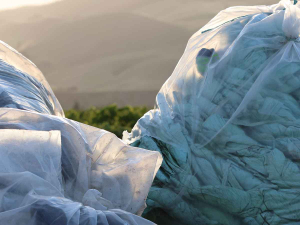Government approves nationwide recycling scheme for primary sector plastics
Rural recycling scheme Agrecovery is welcoming the Government's approval of regulations for a nationwide rural recycling scheme for agrichemicals and farm plastics.
 Agrecovery says the proposed regulations support a national product stewardship scheme for agrichemicals, their containers, and farm plastics.
Agrecovery says the proposed regulations support a national product stewardship scheme for agrichemicals, their containers, and farm plastics.
The Government is calling on rural New Zealanders to share their views on proposed regulations designed to improve the management of farm plastic waste.
Environment Minister Penny Simmonds says the proposal is an industry-led initiative which seeks to bring the existing Agrecovery and Plasback programmes into a single national recycling system, “making services simpler and more accessible for all uses of regulated farm plastics”.
The proposed regulations are designed to support a nationally consistent product stewardship scheme for agrichemicals, their containers, and farm plastics, helping farmers and growers to reduce their environmental impact while maintaining productivity.
“Plastic products are vital to New Zealand’s world-leading agri-economy, but rural communities know that waste like agrichemical containers and bale wrap can quickly pile up,” Simmonds says.
“These regulations will provide a unified system where producers, sellers, and users take responsibility for the entire product lifecycle, from design to disposal.”
Public consultation opened on Monday and will focus on regulations supporting the new product stewardship scheme, provisionally named Green-farms.
In addition to farmers and growers, the scheme would see industries like forestry, manufacturing, hospitality, and tourism, as well as local authorities and households, gain access to national take-back services.
“This scheme offers a practical solution for a wide range of consumers, including households needing proper disposal options for pest and weed control product containers,” Simmonds says.
The programme will ensure farmers have access to free-to-use drop-off sites and collection services while working alongside regulations for producers and importers.
“Key industry stakeholders back the scheme, which offers a better alternative to burning or burying plastic waste on farms. Rural communities want a simple, effective system, and we welcome feedback to refine the proposed regulations.”
Agrecovery chief executive Tony Wilson says the consultation is a positive and long-awaited step forward.
“New Zealand farmers and growers want recycling systems that are easy to use and fit for purpose,” Wilson says. “Regulation will give Agrecovery the tools to scale up services, expand access to recycling, and deliver a more consistent nationwide system for managing the complexity of plastic use in farming today.”
“Agrecovery has worked collaboratively with industry and rural sector stakeholders to develop the Farm Plastics Stewardship Scheme with a clear focus on delivering an effective, efficient and customer-centric solution for New Zealand’s primary sector, ensuring that those who participate in the scheme are at the forefront of its design,” he says.
“By incorporating all key stakeholders – from field to factory – the model has been built with a shared responsibility approach to ensure all plastic along the wider supply chain is managed sustainably,” he adds.
Wilson says the Agrecovery scheme is a practical one that ends the cycle of burning and burying plastic.
“We encourage all stakeholders to make a submission and support the move towards a regulated solution,” he says.
Meanwhile, Agrecovery board chair and farmer, Anders Crofoot, says it’s encouraging to see progress towards a system that works for the people on the ground.
“It’s great to see us moving closer to a regulated scheme that’s simple, free, and accessible for farmers to use,” Crofoot says.
“We know the demand is there – this is about making sure every farmer has access to a service that makes doing the right thing the easy thing,” he says.
Consultation on the new regulations will run until 1 June 2025 and can be made through the Ministry for the Environment’s website.
The World Wide Sires National All Day Breeds Best Youth Camp Best All Rounder plaudit has become family affair, with 2026 Paramount Cup winner Holly Williams following in her sister Zara's footsteps.
DairyNZ is giving New Zealand farmers a unique opportunity to gain hands-on governance and leadership experience within the dairy sector.
Herd improvement company LIC has posted a 5.2% lift in half-year revenue, thanks to increasing demand for genetics.
According to the latest Fresh Produce Trend Report from United Fresh, 2026 will be a year where fruit and vegetables are shaped by cost pressures, rapid digital adoption, and a renewed focus on wellbeing at home.
The Roar is a highlight of the game hunting calendar in New Zealand, with thousands of hunters set to head for the hills to hunt male stags during March and April.
OPINION: The past few weeks have been tough on farms across the North Island: floods and storms have caused damage and disruption to families and businesses.